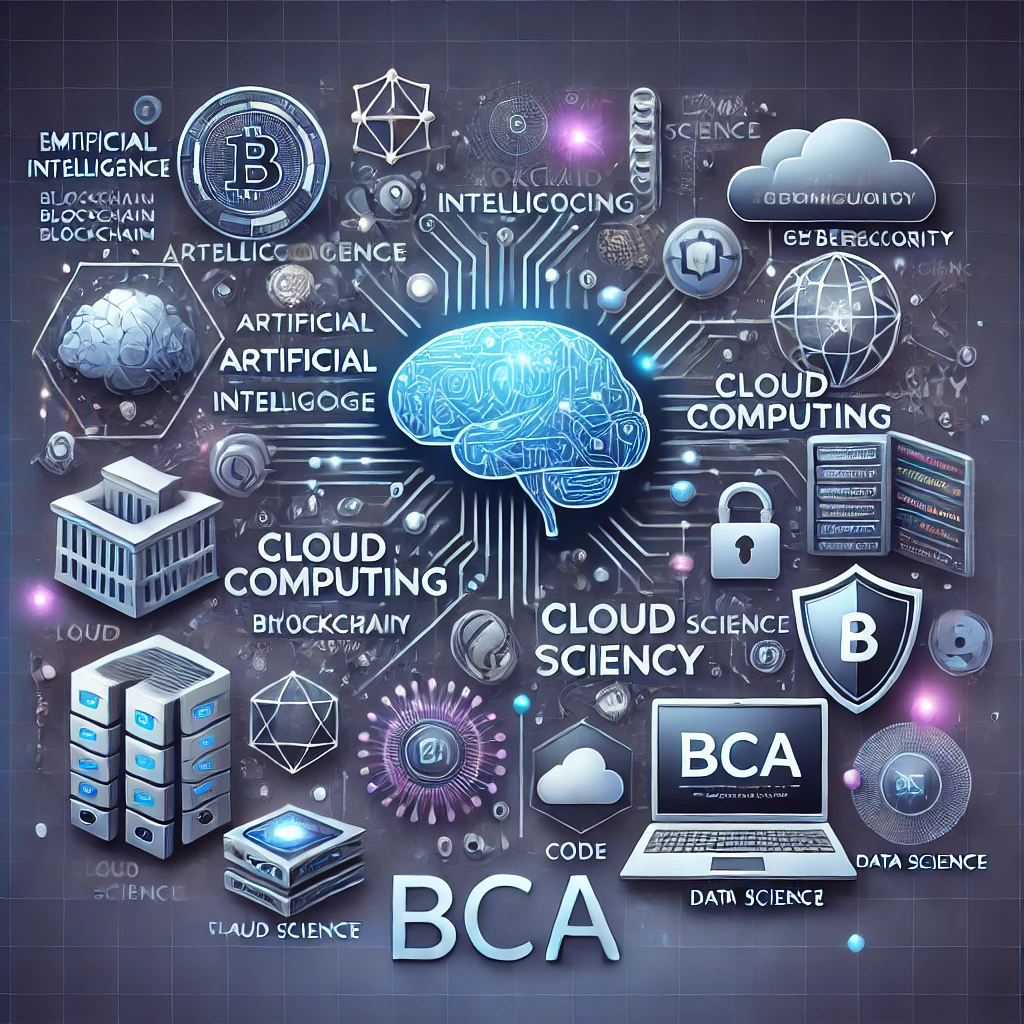Introduction to Emerging Technologies
Emerging technologies refer to novel innovations that have the potential to revolutionize various industries, particularly in information technology. These advancements often embody new paradigms and methodologies that fundamentally change how technology is applied, affecting everything from software development to data management. For Bachelor of Computer Applications (BCA) students, understanding emerging technologies is not merely an academic exercise; it is crucial for aligning their skills with industry demands, as the IT landscape continually evolves.
The rapid pace of technological evolution has consistently reshaped business operations and consumer expectations. For example, concepts such as artificial intelligence, machine learning, and blockchain have introduced not only new tools but also new frameworks for thinking about and addressing problems. Staying informed about such innovations enables BCA students to anticipate industry shifts, adapt their skill sets accordingly, and contribute effectively in their professional roles. As technology progresses, so too do customer requirements and market competition, making it essential for graduates to be well-versed in the latest trends and tools.
Furthermore, emerging technologies play a pivotal role in the job market, as employers are increasingly seeking individuals who possess a strong foundation in these areas. Knowledge of fintech, cloud computing, and cybersecurity can significantly enhance a BCA student’s employability, providing a competitive edge in a saturated marketplace. Awareness of contemporary tools and frameworks ensures that graduates are not just participants in the workforce, but also innovators capable of advancing their fields. Hence, BCA students must prioritize the study of emerging technologies to secure a successful career path in an ever-changing industry.
Key Emerging Technologies Revolutionizing the Industry
As the information technology landscape continues to evolve, several emerging technologies are poised to revolutionize the industry and impact various sectors significantly. Among the most prominent of these technologies are Artificial Intelligence (AI), Machine Learning (ML), Blockchain, Internet of Things (IoT), and Cloud Computing. Each of these innovations bears the potential to redefine business operations and enhance the value proposition for enterprises.
Artificial Intelligence (AI) refers to the simulation of human intelligence in machines designed to think and act like humans. AI is currently being applied in myriad areas, such as virtual assistants, customer service automation, and data analysis. The future of AI holds vast potential, with advancements expected in natural language processing and predictive analytics, further improving decision-making processes.
Closely linked to AI is Machine Learning (ML), a subset of artificial intelligence that focuses on the development of algorithms and statistical models that enable computer systems to perform specific tasks without explicit instructions. Common applications of ML can be found in recommendation systems, image recognition, and financial modeling. The ongoing development of ML frameworks suggests that its future impact will be profound, driving more intelligent automation and personalized experiences.
Another key technology is Blockchain, a decentralized digital ledger that records transactions across numerous devices. Initially designed to support cryptocurrencies such as Bitcoin, blockchain’s applications have expanded to include supply chain management, identity verification, and data security. The inherent transparency and immutability of blockchain technology promise transformative benefits across various industries.
More
The Internet of Things (IoT) connects physical devices to the internet, allowing for data exchange and improved analytics. Applications range from smart home devices to industrial automation. With the proliferation of connected devices, IoT is set to enhance operational efficiency and foster innovative business models.
Finally, Cloud Computing enables on-demand network access to a shared pool of configurable resources, such as storage and applications. The versatility of cloud services supports businesses in improving scalability and reducing operational costs, making it a critical component of modern IT strategies.
In essence, these emerging technologies are shaping the future of IT and business, presenting opportunities for BCA students to engage with and leverage them within their careers.

Skills Required to Harness These Technologies
As emerging technologies continue to transform the landscape of the digital world, it is imperative for Bachelor of Computer Applications (BCA) students to cultivate a diverse array of skills to effectively engage with these innovations. Firstly, technical skills are foundational in this regard. Proficiency in programming languages such as Python, Java, and C++ is essential, as these languages are frequently used in developing applications and systems. Understanding data structures and algorithm development also plays a significant role, enabling students to write efficient code that can handle complex problems encountered in real-world scenarios.
Additionally, data analysis skills cannot be overlooked. With the rise of big data and analytics, BCA students must be adept at utilizing tools like SQL, R, or specialized software such as Tableau to interpret and manipulate data effectively. This capability allows students to derive meaningful insights that can influence business decisions and improve project outcomes. It is similarly crucial for students to familiarize themselves with concepts in machine learning and artificial intelligence, as these areas are becoming increasingly pivotal in the tech industry.
On the other hand, soft skills are equally important in ensuring success in a technology-driven environment. Problem-solving skills enable BCA students to tackle technical challenges with innovative solutions, while critical thinking allows for effective evaluation and analysis of various situations, fostering better decision-making processes. Furthermore, teamwork is essential in collaborative projects, as it emphasizes the importance of communication and cooperation among diverse groups to achieve common goals.
Finally, as the tech field is in a state of continuous evolution, BCA students must also embrace the concept of lifelong learning. Adapting to new developments, learning emerging technologies, and engaging in ongoing professional development are crucial for those aiming to succeed and thrive in this dynamic arena.
Future Trends and Career Opportunities
In the rapidly evolving landscape of technology, BCA students are presented with a plethora of future trends and career opportunities that will shape their professional journeys. As fields such as artificial intelligence, machine learning, data analytics, and blockchain continue to advance, new job roles are emerging across various industries. These technologies are not only transforming how businesses operate but are also creating demand for skilled professionals capable of leveraging these advancements.
For instance, artificial intelligence and machine learning are expected to revolutionize sectors like healthcare, finance, and logistics, paving the way for careers such as AI specialists, data scientists, and algorithm developers. With the rise of big data, the need for data analysts who can interpret complex datasets will grow, allowing professionals to lead data-driven decision-making within organizations. Similarly, blockchain technology is gaining traction beyond cryptocurrency, offering opportunities in cybersecurity, supply chain management, and digital identity verification.
BCA students can prepare themselves to take advantage of these trends by aligning their educational pathways with the skills that are increasingly in demand. Gaining proficiency in programming languages such as Python and R, understanding data visualization tools, and familiarizing oneself with cloud computing platforms will provide a competitive edge. Furthermore, internships, part-time work, and collaborative projects will not only enhance practical experience but also help students build professional networks.
Conclusion
As the technology landscape evolves, continuous learning becomes paramount. Pursuing certifications in emerging technologies, attending workshops, and engaging in online courses will facilitate ongoing skill development. By actively seeking out resources and experiences that foster innovation and adaptability, BCA students can position themselves as valuable assets in the job market, ready to seize the abundant opportunities presented by the future of technology.
Read Our Latest Blog
How to Start with Web Development: A Beginner’s Guide
Phone Number: +91-7488456170
Email ID: abhishek@eepl.me
Our Platforms:
Digilearn Cloud
EEPL Test
Live Emancipation
Follow Us on Social Media:
Instagram – EEPL Classroom
Facebook – EEPL Classroom
Stay connected and keep learning with EEPL Classroom !








